The Crazy, Deadly Horse ‘Race’ That Explains Kyrgyzstan
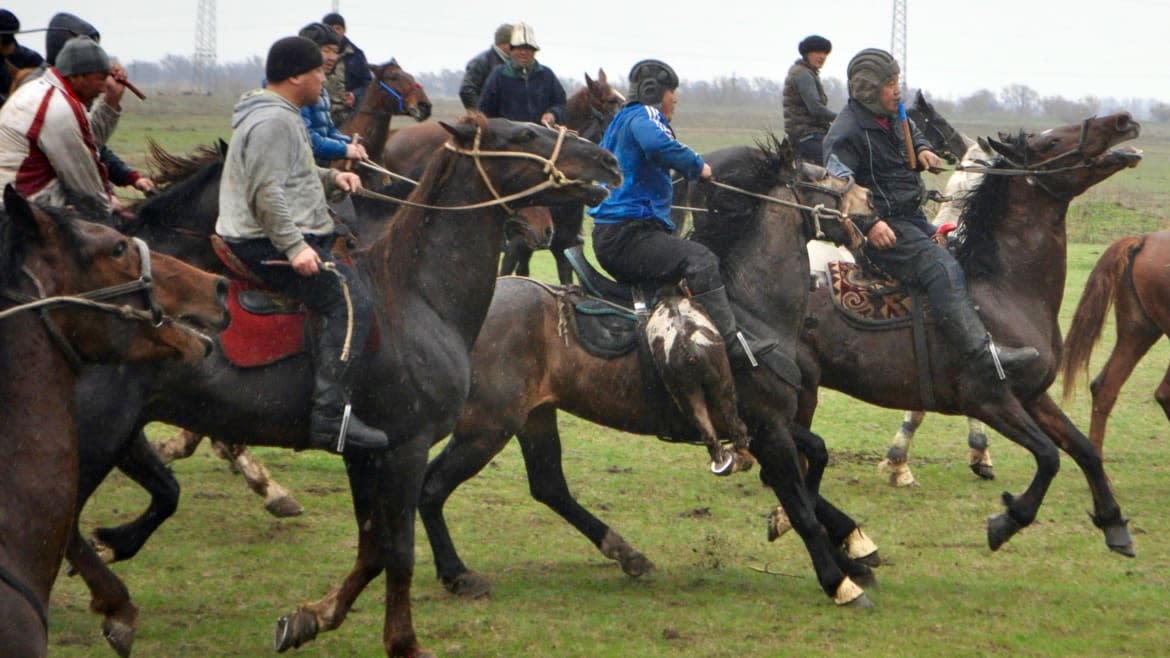
MANAS, Kyrgyzstan— The horses gather into a kind of tornado of hooves, mud, whips, and men. I cling to the rider in front of me as he skillfully guides his horse toward the chaotic center while I try to photograph the violent anarchy that we are chasing.
Welcome to Kyrgyzstan! I was warned that people die playing this ancient game of buzkashi. As we enter the fray, I clearly see why.
We are in the middle of a game of Ulak Tartysh. This is an ancient Kyrgyz variation of buzkashi, essentially just “goat grabbing” on horseback. As far as I can see there are no teams and no rules. It is played with a dead calf not a goat. Amid the mud and rain, I begin to run out of clean dry clothing to clean my camera lens. I resort to my underwear.
This is difficult on horseback. And to the players around me, the crazy little American photographer whom they warned not to participate, looks ridiculous. I later glean that the amazing shots I’m getting of these men grinning at me has more to do with the absurdity of the guy behind the camera than the game.
In buzkashi, as in Kyrgyz politics and culture, there are vague alliances, the traces of what were once clans. At the center is a headless piebald calf that has been gutted and filled with sand. It no longer resembles what it was several hours before when its jugular was swiftly severed with a knife and a prayer according to halal code.
One of the players, if he is lucky, will lean down at full gallop and grab the great mound of flesh by a leg. Miraculously, he will lift it up out of the mud onto his saddle and tear off into the distance as fast as he can.
Beneath the vast grey sky, he and the horse are now one. He whips the animal with a fury that borders on rage. There is blood, sweat, foam, leather, and endless mud in every direction. He has one purpose at this moment as if he were designed for this and it for him. That purpose is to break away from the pack—to ride alone and ahead of the rest.
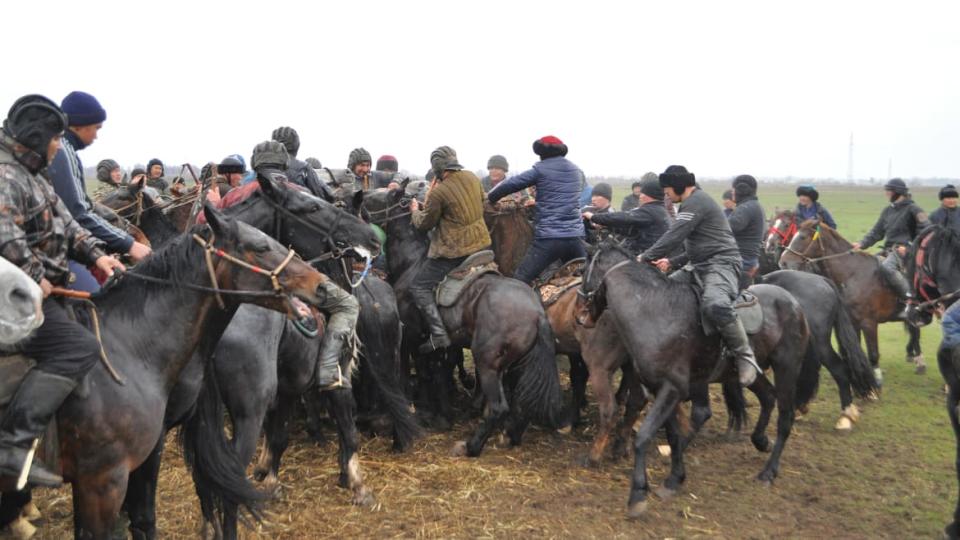
Others charge into him whipping and roaring, attempting to take the headless calf from him. If he is lucky, they will not, and he will ride alone across the endless plain with the piebald upon his lap. In the distance is a small marker. He must reach this with the calf still in his possession to win.
His prize for doing so will be a live sheep or a horse or today even a camel. If he is young, then he will be seen as a man. The elders who sit on the portable stage—just a big rig with an open trailer—will say a prayer over the microphone and present him with the prized animal.
“Why are you here?”
It’s a question I was asked a lot in Bishkek, the Kyrgyz capital. It’s pretty common for any traveler to the stans, as the five central Asian countries, Kazakhstan, Kyrgyzstan, Tajikistan, Turkmenistan, and Uzbekistan, are colloquially known. The mountainous Kyrgyzstan rests in the lower east of the bunch, below the vast Kazakhstan, bordering China.
Sometimes Afghanistan and Pakistan are included in the stans, but these days at least, they tend to fall into their own exclusive category. Unlike other small countries I’ve been to, people in the stans know they are at the edge of the Earth, though geographically they are at its very center.
“Because I’m a journalist,” I say.
There is that wry grin—every traveler knows it. “No really, why are you here?” The tone is almost accusatory, not that they think you are a spy (though they probably do and could not care less), it’s more like: How could a person like you be so dumb or have such bad taste to come all the way here from wherever it was you came from?
“Especially right now?”
No matter who you talk to in Kyrgyzstan this question eventually comes up. If they haven’t led with it. You might even hear it on your way out of the airport in Bishkek, where you will be surrounded by taxi drivers offering rides in Russian, English, or whatever language they think you look like you would speak. These days people fly into Bishkek from a lot of different places. FYI, if you are a citizen of one of these 45 countries you can stay in Kyrgyzstan for up to 60 days without a visa.
But it wasn’t long before I found myself asking that same question while clinging to a large Kyrgyz man in a Soviet tank helmet on the back of a giant wet horse trying to photograph a grungy mash-pit of horses smashing to the tune of some amalgamation of prayer, song and sportscast blaring from a giant microphone mounted on top of the trailer.
I realized something there in the thick of it, while at the mercy of these men, ferociously ramming their horses toward a muddy dead calf filled with sand is as if they are trying to recreate Leonardo’s lost Battle of Anghiari. It dawned on me how many times I’ve risked my life for the stupidest of reasons.
I get existential, as I nearly slip off my horse into the muddy depths below where the hooves of big horses land and young journalists don’t come back: I can’t think of a single risk I’ve taken that had any real consequence. Soon I’ll be as dead as that decapitated sand-filled calf on the ground but I won’t even matter. Nobody’s going to win a camel for dragging my muddy corpse to the sidelines.
In a way this sums up journalism pretty well for me. We risk everything to bear witness to others taking risks sometimes for a cause and sometimes for naught. After two hours of buzkashi in the rain, I’m thinking naught.
The patron of today’s game is a local businessman, though it is often politicians who sponsor buzkashi to build support among the local patriarchies. Men like the notorious kingmaker Rayimbek Matraimov from the south of the country, like its current president, Sooronbai Jeenbekov, whom he is also rumored to influence, see the complex fusion of tradition that constitutes modern Kyrgyz culture as opportunity.
Both the current president and the Kyrgyz kingmaker are in a bitter feud with the country’s former president Almazbek Atambayev, who was recently stripped of his immunity, in order for the current government—the leader of which he chose—to prosecute the former president, a northerner, for abuse of power, including corruption.
In 2017, after serving his six-year term limit, President Atambayev stepped down, leading to the first peaceful transfer of power in this small nation, which because of geography and resources finds itself jostled between the Kremlin and Beijing. The country’s previous two leaders following the fall of the Soviet Union were tossed out after elections in 2005 and 2010.
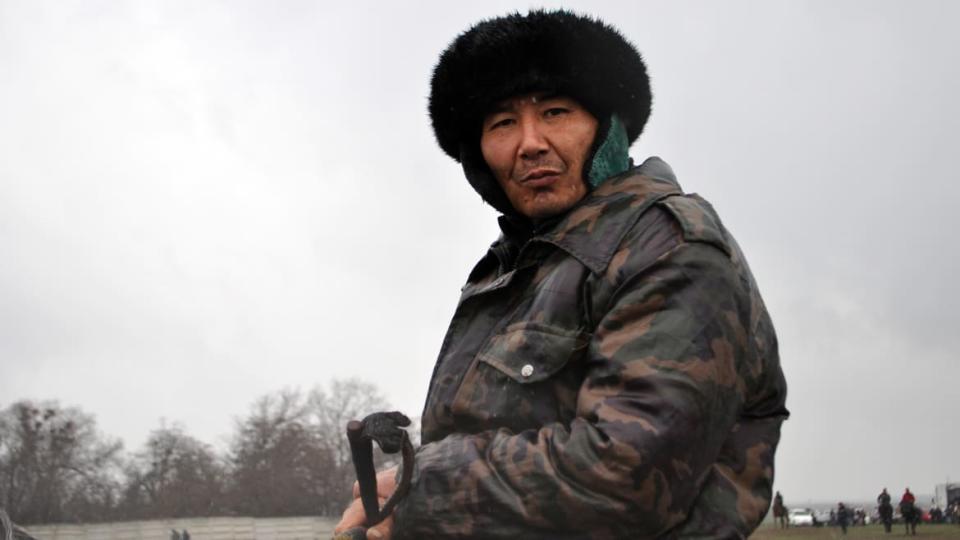
Like the fracas of foaming bloody horses that gather in the game of Ulak Tartysh, mayhem may be once again on the horizon for the landlocked central Asian country of six million people.
Following his peaceful departure in 2017 Atambayev’s successor and former prime minister, Jeenbekov, won the presidency. But soon after, their relationship soured. Atambayev picked Jeenbekov as his successor because he thought he was a man whom he could control. He was wrong.
President Jeenbekov began publicly criticizing the former president for attempting to control and manipulate him as a kind of puppet. First Jeenbekov began firing high-ranking officials who were considered Atambayev allies. Now Jeenbekov is going after Atambayev for corruption and abuse of power during his tenure. The two are currently in a tense standoff.
As of July 19th, 2019, in an alarming response that does not bode well for Kygyz stability, the former president has barricaded himself inside his home some 30 minutes outside the capital. His supporters are setting up yurts in front of Atambayev’s house where they cheer and pray for the for him. For his part, Atambayev, “threatens to use weapons against anyone who tries to remove him.”
Calling the current president “illegitimate,” Atambayev claims “I will use my weapon inside my house.” The former president threatens to prove that “fighting injustice is actually a good Godly cause.”
Worst of all for the former president, prosecutors are investigating how and why he allegedly let the notorious Chechen mafia boss, Aziz Batukayev, out of prison in 2013 on the grounds of a fake leukemia diagnosis. Of course Batukayev immediately flew back to Chechnya for “treatment.” So far “at least four doctors, a judge, a former deputy prime minister and a former health minister,” have been arrested over the forged medical documents in a case that looks like it will go all the way to the top.
As tensions mount, buzkashi is somehow a lens on the chaotic geopolitical scramble that is modern day Kyrgyzstan: every man for himself and only one winner. Corruption itself seems to be a sport. And just as in the nomadic horse game, those backed by the wealthiest patrons usually win. Theirs are the strongest and fastest horses.
People often say that the Kyrgyz were a nomadic people. This is untrue. They are still a nomadic people. Everything from their politics down to their architecture seems temporary, mobile. Even the Soviet housing units, the rows of concrete towers, seem less permanent here.
Even the portable yurts or “grey houses” (because of their color) that nomadic Kyrgyz tribes once lived in are up for rent on Airbnb. These days the traditional felt tents are mostly for tourists near hiking destinations, but beside our game of Ulak Tartysh a yurt is set up where a group of women cook a meat soup in a colossal steel pot to feed us during a break.
I have almost no recollection of this meal. I do not ask what kind of meat it is or what the soup is called. I seem to remember carrots though I could be wrong. Like the others, I do not let the soup cool down before consuming it. I remember it being the best soup of my life. But honestly after hours on horseback in the mud and rain, mine was not an objective assessment. Yours would not be either.
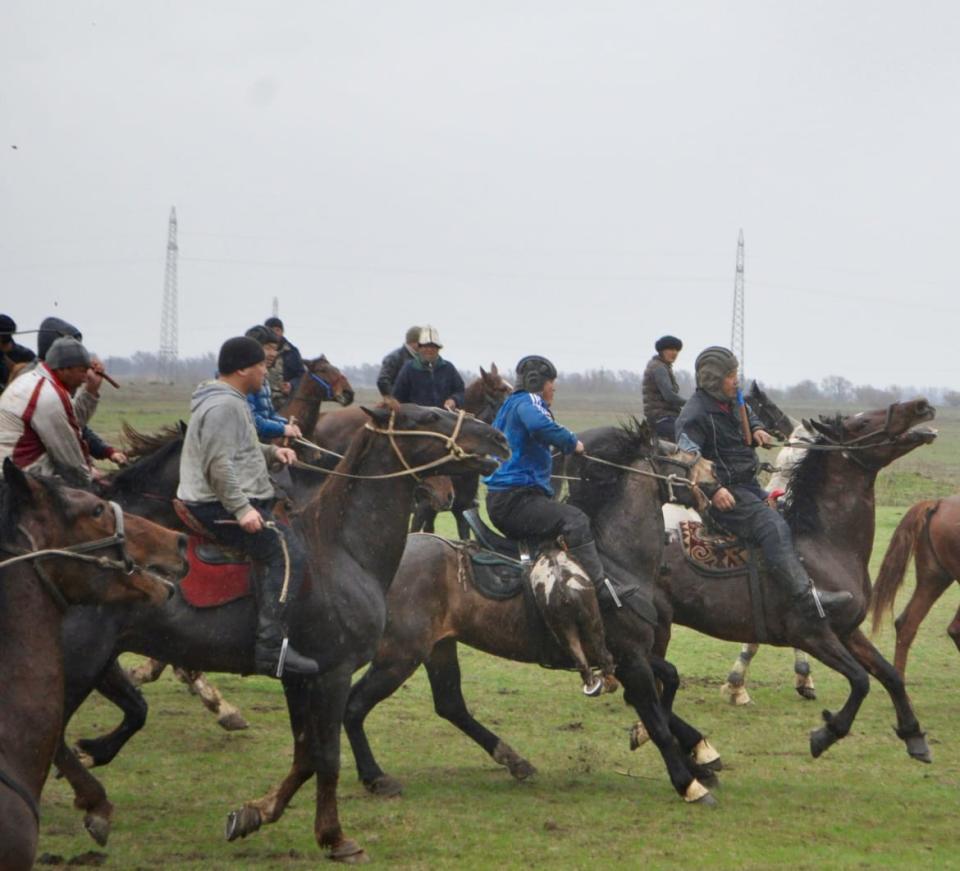
While some cultures might see the term nomad as a fraught idiom, the Kyrgyz seem to embrace their nomadic past, hosting the World Nomad Games for the first three years. The country’s official tourism agency invites visitors to “Visit Kyrgyzstan, the land of celestial mountains, to get to know about the true nomadic lifestyle and unveil the real spirit of freedom and happiness.”
There is some irony to this last part: “the real spirit of freedom and happiness.” In reality, here revolutions come like thunderstorms. Different shades of religion, radicalism, populism, corruption and tribalism come and go like the seasons. Afghan opium floods into the south from several directions, into a hub called Osh, known as the “Opium Knot.”
This is the last game of Ulak Tartysh of the season. “The horses will get too hot,” they say, though it doesn’t seem to be the horses they are most concerned about.
There are few problems this country does not have, and yet the streets of its capital, Bishkek are calm. Expats and foreign journalists lounge in cafes. The tourist industry is thriving. The women of this country seem to do all the work and to keep the peace despite its belligerent state of patriarchy.
Almazbek Atambayev once had a constant refrain in his journey to the presidency, “Whoever kills the dragon becomes the dragon.” And yet somehow he didn’t seem to realize that this was exactly what he became when he took power. Even now as a “retired” dragon, Atambayev is holed up in his dragon lair just outside the capital threatening his predecessor with his “weapons.”
Like Atambayev, President Jeenbekov is accused of corruption, cracking down on the media, and dissidents. Ironically, the new dragon wouldn’t even be the dragon if the old dragon hadn’t endorsed him in the 2017 election. As the saying goes, the more things change...
I went to Kyrgyzstan for the same reason anyone goes anywhere: To get lost and revel in the uncertainty—to be a part of something that might be significant, and to break away from the pack.
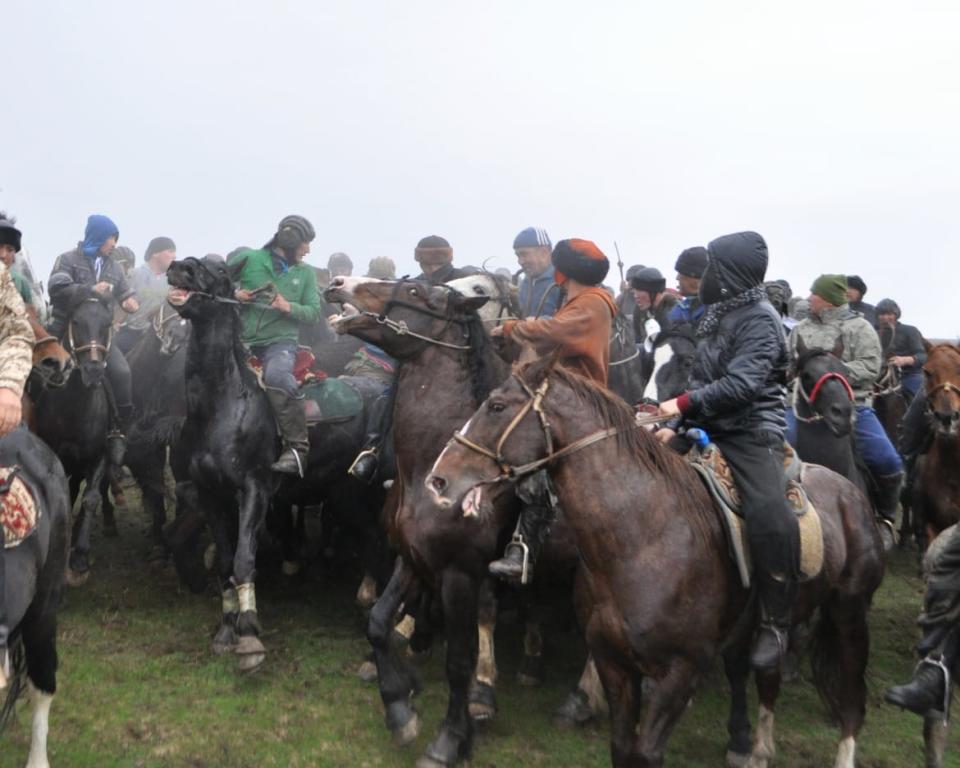
It’s not just a matter of journalism. We all do it. It’s why we travel. From Homer to Kennedy, we wouldn’t do these and “the other things” if they were easy. We travel and then we go home, to tell our story, to try to relate. And if we are lucky, someone might listen. And then maybe others will try and do the same.
I’ve done a lot of traveling by the way, and I’ve never “found myself.” At the best of my travels, I’ve lost myself.
As the ever-irreverent Russell Brand put it: “Innit like when you go away on holiday, you think 'oh yeah, I'd better go away on holiday, cheer myself up, get away from it all" but when you go on holiday, you're there, so it's shit!” No matter how far or fast you run. There you are.
That is the nature and the paradoxical beauty of the game of buzkashi: simultaneously proving oneself as part of the pack whilst tearing away from that herd with the object that everyone at that moment wants more than anything—to become the victor, a hero, even for just a short while.
Kyrgyzstan certainly wasn’t how I’d imagined it. Even now I still remember the country as just those muddy flatlands of thundering horses (more like that of Kazakhstan) instead of Kyrgyzstan's juniper-covered mountain slopes that make it stand out from the other stans.
For me Kyrgyzstan and buzkashi endlessly overlap, and the only way for this notion not to metastasize is to go back soon and often. I can’t wait to do so.
Get our top stories in your inbox every day. Sign up now!
Daily Beast Membership: Beast Inside goes deeper on the stories that matter to you. Learn more.

